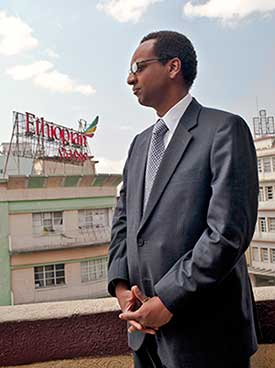Fasil Amdetsion ’07 has been writing about relations between Ethiopia and surrounding states since he was a student at Harvard Law School. Not long after he became an associate at Wachtell, Lipton, Rosen & Katz in New York, his articles had earned him recognition from The Huffington Post as a “global thought leader.”
But since last fall, he’s gone from writing about Ethiopia to working for its government.
In September, Fasil began serving in the Ethiopian Ministry of Foreign Affairs in Addis Ababa, where he is now senior policy and international legal adviser. His job includes everything from policy and international legal matters, to speechwriting, to providing advice on reforming the internal workings of the ministry.
“There are a growing number of young Ethiopians, some of them friends, who have returned from abroad to take advantage of opportunities, particularly in the burgeoning private sector,” he says. “That makes my choice just a little less unorthodox.”
The child of Ethiopian parents who left the country in the ’70s, Fasil was born in the U.S. but raised in Italy, where his father worked for the U.N. He first went to Ethiopia in 2003 on a postgraduate fellowship from Yale, working at the United Nations Development Programme and then interning at the Ministry of Foreign Affairs.
He says that after graduating from law school, he hadn’t necessarily planned to work in government again, but the timing for a return to the country seemed ideal.
There are challenges facing Ethiopia in the foreign relations realm, he says—“the natural outcome of living in a tumultuous neighborhood.” He cites the “continuing stalemate” between Ethiopia and Eritrea following the conclusion of a border war and the “difficult situation” in Somalia, where African Union troops are trying to support a transitional federal government to defeat Al Qaeda-affiliated Al Shabab. He also notes the ongoing hostilities between Sudan and South Sudan. Ethiopia is regarded favorably by both states, he says, and “is the only country they both trusted to do the peacekeeping in the contested Abyei region.”
“The allure of grappling with these issues, and the opportunity to hopefully make a positive contribution, was irresistible,” he adds.
Committed to a two-year stint, so far he’s assisted with a new treaty-making provision as well as a bill that would lead to the development of the first career foreign service in the country. In April, he served as the focal person within the ministry helping to facilitate the first Tana High-Level Forum on Security in Africa, which brought together in an informal setting African heads of state as well as representatives of civil society, business and academia, with the aim of influencing policymaking. He will also be a member of Ethiopia’s delegation to the upcoming Non-Aligned Movement summit in Sharm el-Sheikh.
He cites challenges in the foreign relations realm: “The natural outcome of living in a tumultuous neighborhood.”
When asked about criticisms of Ethiopia’s domestic politics, Fasil says that the reality is complex and reflects the difficulty of operating in a developing country: “Just as there remains plenty of work to be done to catapult Ethiopia into the ranks of more economically developed states, there is much to do in the political and judicial spheres in terms of good governance and judicial institutions.”
Fasil continues to write and publish, including on the topic of transboundary water resource disputes, focusing on the use of the Nile, the topic of his 3L paper at HLS. (His next article will appear in Johns Hopkins’ SAIS Review of International Affairs.)
“Ethiopia and other upper riparian states contribute all of the water,” he says, “but because of the geopolitics of the region and unfair colonial legacies, Egypt and Sudan, which contribute none of the water, have been the sole beneficiaries.” However, he points out that in recent years “upstream countries have become determined to harness the river’s potential—particularly Ethiopia, which has embarked on construction of a $4.8 billion dam (the biggest hydroelectric dam in Africa) along the Nile.”
“It’s a tremendously significant issue,” he says, “in a part of the world where people are dependent on agriculture, and where water used for irrigation and hydroelectric power can have a transformative effect on people’s lives.”
